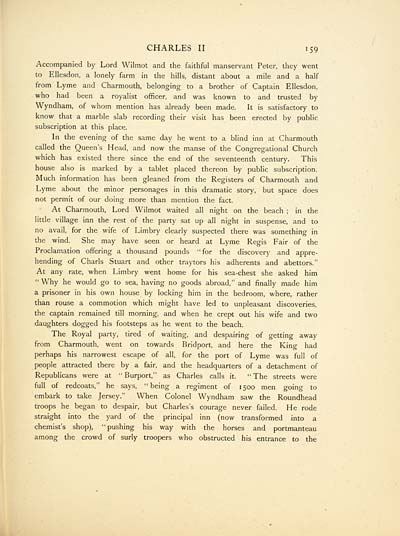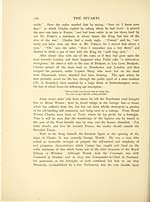Stuarts
(211) Page 159
Download files
Complete book:
Individual page:
Thumbnail gallery: Grid view | List view

CHARLES II 159
Accompanied by Lord Wilmot and the faithful manservant Peter, they went
to Ellesdon, a lonely farm in the hills, distant about a mile and a half
from Lyme and Charmouth, belonging to a brother of Captain Ellesdon,
who had been a royalist officer, and was known to and trusted by
Wyndham, of whom mention has already been made. It is satisfactory to
know that a marble slab recording their visit has been erected by public
subscription at this place.
In the evening of the same day he went to a blind inn at Charmouth
called the Queen's Head, and now the manse of the Congregational Church
which has existed there since the end of the seventeenth century. This
house also is marked by a tablet placed thereon by public subscription.
Much information has been gleaned from the Registers of Charmouth and
Lyme about the minor personages in this dramatic story, but space does
not permit of our doing more than mention the fact.
At Charmouth, Lord Wilmot waited all night on the beach ; in the
little village inn the rest of the party sat up all night in suspense, and to
no avail, for the wife of Limbry clearly suspected there was something in
the wind. She may have seen or heard at Lyme Regis Fair of the
Proclamation offering a thousand pounds "for the discovery and appre-
hending of Charls Stuart and other traytors his adherents and abettors."
At any rate, when Limbry went home for his sea-chest she asked him
"Why he would go to sea, having no goods abroad," and finally made him
a prisoner in his own house by locking him in the bedroom, where, rather
than rouse a commotion which might have led to unpleasant discoveries,
the captain remained till morning, and when he crept out his wife and two
daughters dogged his footsteps as he went to the beach.
The Royal party, tired of waiting, and despairing of getting away
from Charmouth, went on towards Bridport, and here the King had
perhaps his narrowest escape of all, for the port of Lyme was full of
people attracted there by a fair, and the headquarters of a detachment of
Republicans were at " Burport," as Charles calls it. "The streets were
full of redcoats," he says, "being a regiment of 1500 men going to
embark to take Jersey." When Colonel Wyndham saw the Roundhead
troops he began to despair, but Charles's courage never failed. He rode
straight into the yard of the principal inn (now transformed into a
chemist's shop), "pushing his way with the horses and portmanteau
among the crowd of surly troopers who obstructed his entrance to the
Accompanied by Lord Wilmot and the faithful manservant Peter, they went
to Ellesdon, a lonely farm in the hills, distant about a mile and a half
from Lyme and Charmouth, belonging to a brother of Captain Ellesdon,
who had been a royalist officer, and was known to and trusted by
Wyndham, of whom mention has already been made. It is satisfactory to
know that a marble slab recording their visit has been erected by public
subscription at this place.
In the evening of the same day he went to a blind inn at Charmouth
called the Queen's Head, and now the manse of the Congregational Church
which has existed there since the end of the seventeenth century. This
house also is marked by a tablet placed thereon by public subscription.
Much information has been gleaned from the Registers of Charmouth and
Lyme about the minor personages in this dramatic story, but space does
not permit of our doing more than mention the fact.
At Charmouth, Lord Wilmot waited all night on the beach ; in the
little village inn the rest of the party sat up all night in suspense, and to
no avail, for the wife of Limbry clearly suspected there was something in
the wind. She may have seen or heard at Lyme Regis Fair of the
Proclamation offering a thousand pounds "for the discovery and appre-
hending of Charls Stuart and other traytors his adherents and abettors."
At any rate, when Limbry went home for his sea-chest she asked him
"Why he would go to sea, having no goods abroad," and finally made him
a prisoner in his own house by locking him in the bedroom, where, rather
than rouse a commotion which might have led to unpleasant discoveries,
the captain remained till morning, and when he crept out his wife and two
daughters dogged his footsteps as he went to the beach.
The Royal party, tired of waiting, and despairing of getting away
from Charmouth, went on towards Bridport, and here the King had
perhaps his narrowest escape of all, for the port of Lyme was full of
people attracted there by a fair, and the headquarters of a detachment of
Republicans were at " Burport," as Charles calls it. "The streets were
full of redcoats," he says, "being a regiment of 1500 men going to
embark to take Jersey." When Colonel Wyndham saw the Roundhead
troops he began to despair, but Charles's courage never failed. He rode
straight into the yard of the principal inn (now transformed into a
chemist's shop), "pushing his way with the horses and portmanteau
among the crowd of surly troopers who obstructed his entrance to the
Set display mode to:
![]() Universal Viewer |
Universal Viewer | ![]() Mirador |
Large image | Transcription
Mirador |
Large image | Transcription
Images and transcriptions on this page, including medium image downloads, may be used under the Creative Commons Attribution 4.0 International Licence unless otherwise stated. ![]()
| Histories of Scottish families > Stuarts > (211) Page 159 |
|---|
| Permanent URL | https://digital.nls.uk/95241583 |
|---|
| Description | A selection of almost 400 printed items relating to the history of Scottish families, mostly dating from the 19th and early 20th centuries. Includes memoirs, genealogies and clan histories, with a few produced by emigrant families. The earliest family history goes back to AD 916. |
|---|

